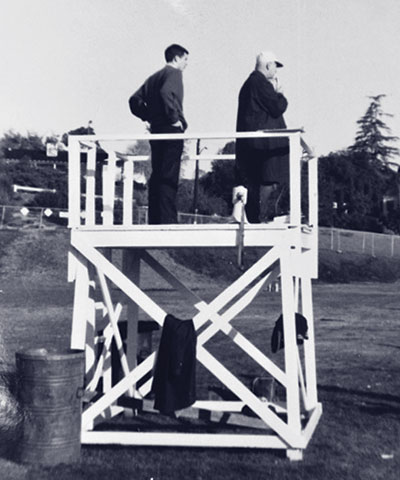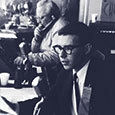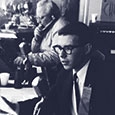Some of my favorite recordings can be found in The Revelli Years, the legendary five-box, twenty-four LP set released by Golden Crest Records between 1980 and 1983. These recordings, all from live concerts under the baton of William D. Revelli, set a new standard for university bands, and the performances in this collection are still a marvel.
Strangely, The Revelli Years was never released digitally, so the only way to listen to these recordings is via the original LPs. Seeking to excavate them from obscurity, I resolved that one of my pandemic projects would be to digitize this collection, one LP at a time, in my university’s audio lab and post them on YouTube for a new generation to enjoy. The response was beyond my expectation.
One special email came from Arthur Cohen, whose voice can be heard on these recordings as the announcer for the University of Michigan Marching Band. Cohen was a graduate student at Michigan in the 1960s during Revelli’s tenure as the conductor of both the symphonic and marching bands. Eager to learn more about his experiences, we conducted an interview by Zoom.
Cohen and Revelli in 1964.

What led you to the University of Michigan, and how did you wind up as the announcer for the University of Michigan Marching Band?
It was 1964, and I was about to graduate from Boston University. I won a National Association of Broadcasting scholarship. The University of Michigan offered a graduate degree in communication and getting a master’s degree from Michigan seemed like a good choice. I applied and was accepted into the program.
Several days after getting settled in Ann Arbor, someone handed me a postcard announcing the search for a band announcer for the University of Michigan Marching Band. While in past years the announcer had come from the School of Music, my new acquaintance thought that my former work as a news anchor at WBUR in Boston might make me a good candidate for the post.
The postcard had the name and telephone number of the director of bands, William D. Revelli. I had no idea that at Michigan Revelli was a god. I also had never been to a Big Ten school and had never seen the Michigan Band perform. Nevertheless, I called the number and arranged to meet Revelli the following day.
What were your first impressions of Revelli?
The north campus of the university, which eventually housed the music school and Revelli Hall, did not exist in 1964, so I met Revelli in a small house nearby that had become his office. Revelli was seated behind his desk in front of a long row of filing cabinets. After a few moments of pleasantries, Revelli told me, as I had suspected, “The announcer usually comes from our music school, but please, let me hear you.”
“Dr. Revelli,” I started, “I honestly have no idea what the Michigan band announcer sounds like. In fact, I have never even been to Big Ten football game. I have only been on campus for a few days, and someone handed me this postcard saying you were looking for an announcer for the Michigan band.”
To Revelli’s credit, he didn’t toss me out. I think he was a bit stunned, and perhaps amused, but he got up and pulled a script from a drawer in the filing cabinet and handed it to me. Standing in front of the seated god, I began: “Ladies and gentlemen…presenting the University of Michigan Marching Band under the direction of William D. Revelli….” I continued reading a few more paragraphs until I reached the final “Band, take the field!”
He smiled. He must have liked it. Being the consummate perfectionist that he was, he asked, “Would you meet me at the Michigan Stadium tomorrow? I would like to hear you in the stadium.” “I would if I knew where it was,” I replied. Once again, he smiled and laughed, and we set a time.
What did it feel like to be there that first time?
The Big House, home to the Michigan Wolverines, sits in a bowl. Its profile doesn’t do it justice. From the top of the press box, you can look down to an enormous field with seating for over 110,000 spectators. Newly painted on the center of the grass field was the famous Block M. Standing on the M was Revelli. Other than the custodian who escorted me to the press box overhead, we were alone in that immense temple of football.
Revelli looked very small from my perch so far away. He waved at me to begin, and, strapping on a microphone, I completed the audition. There must have been something in the water because the next morning he called me with the news that I was the announcer for the famous University of Michigan Marching Band for the 1964-65 season.
.jpg)
What were some of the challenges you encountered as you settled into the job?
The first game coincided with Band Day when thousands of high school band students were invited to participate. Announcing the entrance of the high school band from Ypsilanti, Michigan gave me pause. I had never seen the word. After pushing the mute button on the microphone stand, a local reporter helped me through what could have been my first blunder. It all worked out in the end.
In November, we traveled to Columbus for our annual rivalry game against Ohio State. The band was performing Threnody: An Elegaic Tribute to the Memory of John F. Kennedy by Richard Maltby. My narration included reading a portion of Kennedy’s inauguration speech while the band was playing. Imagine my surprise on game day when I learned that the announcing booth at Ohio Stadium was soundproof – I couldn’t hear the band! Fortunately, I had written my script on a copy of a first trumpet score. By watching Revelli’s conducting pattern, and counting, we made it to the end of the piece, and all was well. We got through it, and Revelli hugged me afterwards. I never told him what had happened.
Another huge challenge was time management. Daily band practice, performances each Saturday, and travel to away games made it difficult for me to invest the kind of time I needed to successfully complete the courses I was taking for my master’s degree. There were projects, papers and tests galore. A great deal of additional time was required just to type out reports and the like.
Looking to solve this organizational nightmare, I created a calendar on a huge artist board. Using colored markers, I devised a color-coded system: red meant a test, project, or paper deadline, yellow was for band travel, and green was for something I no longer remember. To complete the item in red, I sometimes had to finish a paper several weeks before the deadline. It was a good lesson in organization.
On a more positive note, what were the highlights of that season?
The 1964-65 year was great for Michigan football. They went 9–1, and at the end of the season I traveled with the band to the Rose Bowl and to Disneyland. Revelli, pleased with my work, asked me to stay on as announcer for the University of Michigan Symphonic Band in the spring, and we went on a tour of the Midwest. During the year, I became very close with Revelli and his family, and he often invited me over to his home for meals. These are wonderful memories.
.jpg)
What was he like and what did you learn from him?
Revelli was always very kind and to me – congenial and fatherly. He treated me like I was a member of his family. Some of the band members, however, were fearful of him. Revelli had a fierce dedication to excellence and was a stern taskmaster. A band member once explained that the “sequence of our attitudes toward him often went from fear to anger to respect to awe to reverence.” It was said that anyone who had come in contact with him was left with an impression that would last a lifetime.
His attention to perfection definitely rubbed off on me as well. For a long while after graduating from Michigan, I could not listen to the radio. After working with Revelli, I realized that many of the groups that were popular at the time didn’t live up to his standards, and it bothered me to hear things like wrong notes and out-of-tune singing.
I distinctly recall a speech that Revelli gave immediately before the Rose Bowl. It was so memorable that I wrote it down. He said: “Demand of yourself! How much do you demand of yourself? Not even 10 percent, some of you. How can you dedicate yourself to your future positions in the musical world when you can’t dedicate yourself right now to what you’re doing in a simple little march? The world is full of people who do things just about right. Just about. And a few at the top do them just right – most of the time. Nobody’s perfect!
“When are you going to start demanding of yourself what I demand of myself? When are you going to be as uncompromising with what you do as I am uncompromising in what I hear and what I insist on? When? Are you waiting for some miracle? The miracle will be when you demand of yourself everything you’ve got of yourself. And I don’t only mean 5 minutes out of 10; I mean 10 minutes out of 10; I mean 60 minutes out of an hour, 24 hours a day, or at least all of your waking hours. I don’t want it to be just about right! To me, just about right is terrible!
“Now, nobody is killed when you play a half note as a dotted quarter. But you might, from learning to play a half note as a full half note, make the difference in the lives of 50,000 little kids who are hearing somebody play beautifully. I don’t care if it’s Stars and Stripes, The Victors, or something else. There’s a pride in doing it just right. Anyone who does less can be forgiven, but more, they should be pitied.” It is hard to imagine anyone giving a speech like that today, but it worked, and the band consistently rose to his standard of excellence.
What path did your life take after Michigan?
After working in advertising as a television producer and traveling most of the time, I switched careers and became a life insurance agent. I am now semi-retired and live with my wife, a retired attorney, and two West Highland Terriers.
I continue to perform music as a hobby. I have a background in woodwind instruments, own several guitars, and play banjo and guitar in five-man band with my former rabbi. I am looking forward, as we all are, to end of the pandemic when we can gather and make music again.






